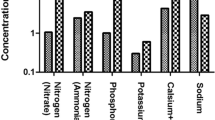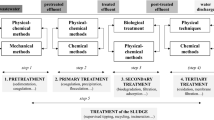Abstract
The compliance of wastewater authorities with the Water Framework Directive (WFD, 2000/60/EC) although may highly contribute to a “good” ecological status in aquatic ecosystems, is alleged to require disproportionally high costs in relevance to the anticipated benefits. This is mainly due to the limited yet research in the assessment of the economic welfare derived by the compliance with the WFD. In this light, the direct and indirect economic benefits emerged by the attaining of WFD are investigated. The wastewater treatment plant of Athens (Greece) is demonstrated as a comprehensive pilot case.
Similar content being viewed by others
References
Amir S (1995) The environmental cost of sustainable welfare. Ecol Econ 13:27–41
Athens Stock Exchange (2007) Athens Water Supply and Sewage Co. http://www.ase.gr/content/en/companies/ListedCo/Profiles/profile.asp?cid=778
Athens Water Supply and Sewerage Company S.A. (2007a) Annual Bulletin 2000, Athens 2001. http://www.eydap.gr/media/financialdata/yearly/etisio_deltio_2000.pdf
Athens Water Supply and Sewerage Company S.A. (2007b) Annual Bulletin 2005, Athens June 206. http://www.eydap.gr/media/financialdata/annual_reports_en/Annual_Bulletin_2005.pdf
Bateman IJ, Willis KG (eds) (1998) Valuing environmental preferences: theory and practice of the contingent valuation method in the U.S., E.U., and developing countries. Oxford University Press, Oxford
Brouwer R (2004) The concept of environmental and resource cost. Lessons learned from ECO2. In: Brouwerand R, Strosser P (eds) Environmental and resource cost and the water framework directive. An overview of European practices. RIZA Working Paper 2004. 112x, Amsterdam, Holland
CD4WC D 1.1 (2004) Data Analysis-Full Scale Systems, TU Dresden (on behalf of CD4WC), Dresden. 264 pp, www.cd4wc.org
CD4WC Deliverable 1.2 (2004) Identification of interactions in present full-scale systems, BIOMATH (on behalf of CD4WC), Faculty of Agricultural and Applied Biological Sciences; Ghent University. www.cd4wc.org
De Groot R, Wilson M, Boumans R (2002) A typology for the classification, description and valuation of ecosystem functions, goods and services in SPECIAL ISSUE: the dynamics and value of ecosystem services: integrating economic and ecological perspectives. Ecol Econ 41(2002):393–408
Farber S, Costanza C, Wilson R (2002) Economic and ecological concepts for valuing ecosystem services. Ecol Econ 41(3):375–392
Fujita Y, Fujii A, Furukawa S, Ogawa T (2005) Estimation of willingness-to-pay (WTP) for water and sanitation services through contingent valuation method (CVM), a case study in Iquitos City, the Republic of Peru, JBICI Review No.11, March 2005, pp 59–87
General Secretariat of National Statistical Services of Greece (2007) Indices. http://www.statistics.gr/Main_eng.asp
Genius M, Hatzaki E, Kouromichelaki E, Kouvakis G, Nikiforaki S, Tsagarakis KP (2008) Evaluating consumers’ willingness to pay for improved potable water quality and quantity. Water Resour Manag. doi:10.1007/s11269-008-9255-7. 0920–4741 (Print), 1573–1650 (Online)
Grimble R, Wellard K (1997) Stakeholder methodologies in natural recourse management: a review of principles, contexts, experience and opportunities. Agricultural Syst 55(2):173–193
Heinz I, Pulido-Velazquez M, Lund JR, Andreu J (2007) Hydro-economic modeling in river basin management: implications and applications for the European Water Framework Directive. Water Resour Manag 21:1103–1125. doi:10.1007/s11269-006-9101-8
Hennipman P (1985) Welfare economics and the theory of economic policy. Edward Elgar, Cheltenham
Kontogianni A, Langford I, Papandreou A, Skourtos M (2003) Social preferences for improving water quality: an economic analysis of benefits from wastewater treatment. Water Resour Manag 17:317–336
Loomis J (1987) Expanding contingent value sample estimates to aggregate benefit estimates: current practices and proposed solutions. Land Econ 63(4):396–402, (Nov. 1987)
Mishan EJ (1981) Introduction to normative economics. Oxford University Press, Oxford
Munda G (1996) Cost–benefit analysis in integrated assessment: some methodological issues. Ecol Econ 19(1996):157–168
Ng Y (1980) Welfare economics. Edward Elgar, Cheltenham
NOOA (1995) Referendum design and contingent valuation: the NOAA panel’s no-vote recommendation. Discussion Paper 96–05, November 1995, Resources for the Future
Norberg J (1999) Linking nature’s services to ecosystems: some general ecological concepts. Ecol Econ 29(1999):183–202
Nunes P, Breil M, Gambarelli G (2005) Economic valuation of on site material damages of high water on economic activities based in the city of Venice: results from a dose-response-expert-based valuation approach, FEEM Working Paper No. 53.05
Pierson C, Castles F (2000) A welfare state. Polity Press, Cambridge
Pigou AC (1960) The economics of welfare. Macmillan and Co. Ltd., London
Ramirez R (1999) Stakeholder analysis and conflict management. In: Buckles D (ed) Cultivating peace: conflict and collaboration in natural resource management. International Development Research Centre and World Bank Institute, Ottawa, pp 101–126
Shabman LA, Batie S (1978) Economic value of natural coastal wetlands: a critique. Coast Zone Manage J 4:231–247
Sundberg S (2004) Replacement costs as economic values of environmental change: a review and an application to Swedish sea trout habitats. Beijer International Institute of Ecological Economics, The Royal Swedish Academy of Sciences, Stockholm
United Nations Framework Convention on Climate Change—UNFCCC (2008) Feeling the Heat. http://unfccc.int/essential_background/feeling_the_heat/items/2918.php
Vatn A, Bromley D (1994) Choices without prices without apologies. J Environ Econ Manage 26:129–148
WATECO (2002) Guidance document and annexes. CISWorkingGroup 2.6 onWater and Economics, Brussels
Wattage P, Soussan J (2003) Incorporating environmental value and externality in project evaluation as a sustainability indicator to evaluate Bangladesh Water Development. Water Resour Manag 17:429–446
Wei Y, Davidson B, Chen D, White R, Li B, Zhang J (2007) Can contingent valuation be used to measure the in situ value of groundwater on the North China plain? Water Resour Manag 21:1735–1749. doi:10.1007/s11269-006-9123-2
WFD CIRCA (2007) The Information Exchange Platform. http://ec.europa.eu/environment/water/water-framework/information.html
Author information
Authors and Affiliations
Corresponding author
Rights and permissions
About this article
Cite this article
Xenarios, S., Bithas, K. Welfare Improvisation from the Receiving Waters of Urban Wastewater Systems in the Context of the Water Framework Directive. Water Resour Manage 23, 981–1000 (2009). https://doi.org/10.1007/s11269-008-9310-4
Received:
Accepted:
Published:
Issue Date:
DOI: https://doi.org/10.1007/s11269-008-9310-4




